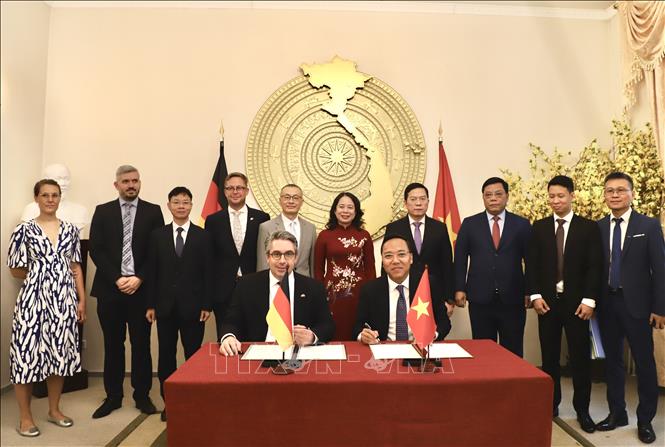HCMC — Vietnam and Germany have established a bilateral energy partnership aimed at advancing the energy transition and enhancing energy security, according to a joint statement signed on July 3 (local time) in Berlin.
Vietnamese Deputy Minister of Industry and Trade Nguyen Hoang Long and Stefan Rouenhoff, Parliamentary State Secretary at the Federal Ministry for Economic Affairs and Energy of the Federal Republic of Germany, signed the declaration, marking a significant upgrade in bilateral cooperation.
The new partnership sets out a comprehensive framework to promote renewable energy development, decarbonization, and digital transformation of the power sector. Key areas of cooperation include offshore wind power, solar energy, green hydrogen, energy efficiency, power grid modernization, and low-carbon solutions for hard-to-abate sectors.
The implementation mechanism involves the formation of an annual high-level steering committee, technical working groups, and joint initiatives in research, training, and business networking. These efforts aim to deepen collaboration and support both countries’ sustainable development goals.
Germany is currently Vietnam’s second-largest trading partner in Europe and serves as a strategic gateway for Vietnamese goods entering the EU market. The energy partnership aligns with Germany’s broader strategy to diversify supply chains and foster global climate cooperation.
Following the signing ceremony, Long held bilateral talks with Rouenhoff. He outlined Vietnam’s long-term energy strategy under the National Power Development Plan VIII, which targets renewable energy to account for 47–53% of total generation capacity by 2030. This includes 46–73 gigawatts (GW) of solar power and 32–55 GW of wind power.
Vietnam expressed interest in expanding collaboration with Germany in green hydrogen development, workforce training, and building a Vietnam-Germany energy ecosystem.
Later in the day, Long attended a roundtable focused on German support for renewable energy hubs in Vietnam. German companies presented progress updates on their projects and discussed future cooperation opportunities, while also highlighting regulatory and operational challenges that need resolution.









